Five places to have Korean food in Kathmandu
The pandemic confined people to their homes. During the lockdown, the eating-out culture disappeared overnight. Now it is slowly making a comeback. And business is picking up in Korean eateries in Kathmandu as well, primarily thanks to valley locals. More and more Kathmanduites seem to be taking to Korean delicacies. Fancy a bite yourself? Here are five places to choose from.
Gangnam Galbi Restaurant
South Korean national Ilsoo Choi established the Gangnam Galbi Restaurant near the Narayanhiti Palace Museum, Kathmandu, in 2015. Having arrived in Nepal seven years before that, he liked the country enough to stay behind and open a restaurant.
The restaurant mainly offers non-vegetarian items, so it’s basically a place for meat lovers. Chicken and pork BBQ are among the most popular items, with price ranging from Rs 400 to Rs 3,000. Customers can even make the barbeque themselves. There is parking facility to accommodate six four-wheelers and 20 motorcycles at a time. Among the Korean beverages available here: Soju, a Korean Raksi, and Makgeolli, the Korean Chhaang.
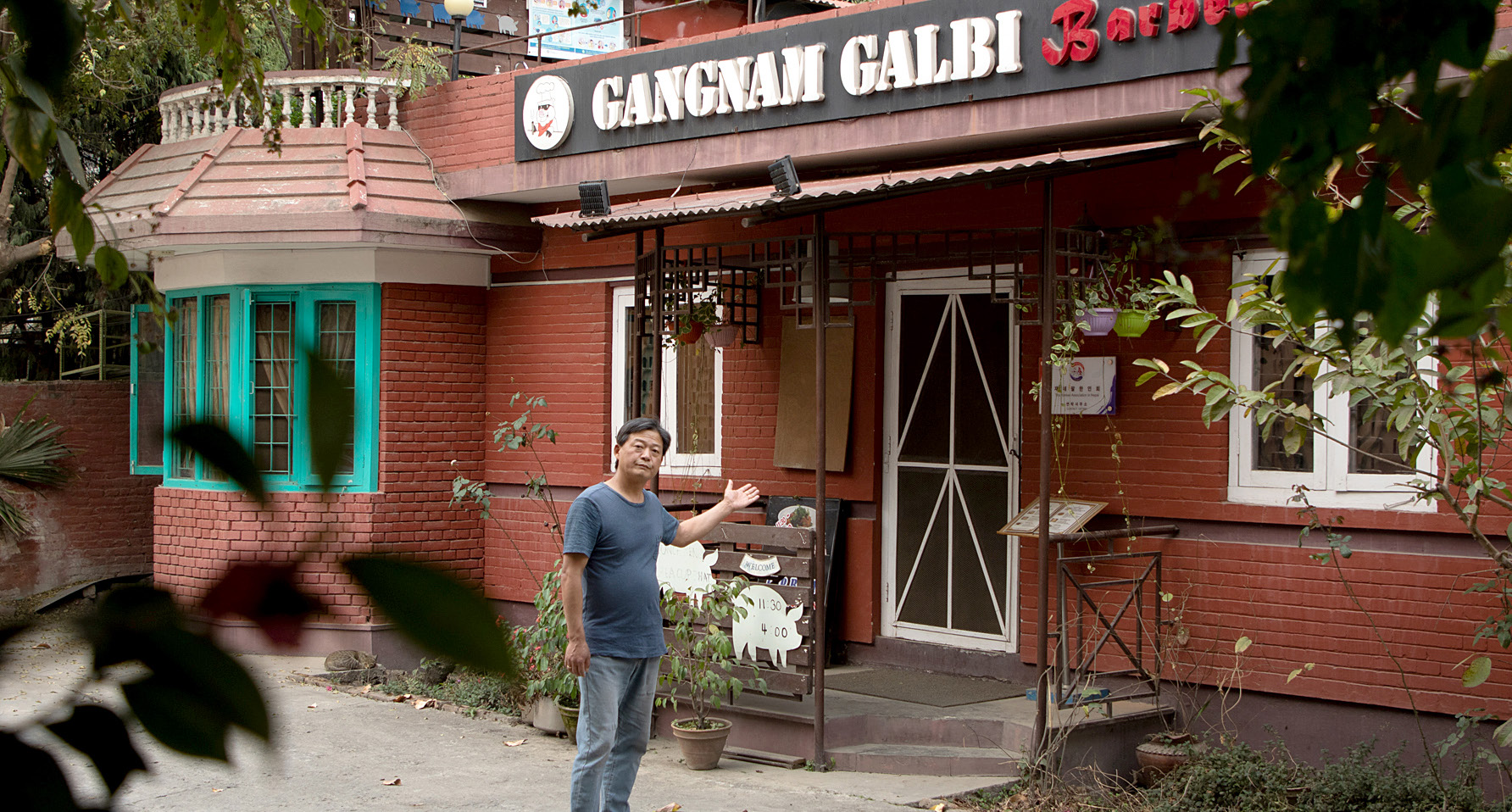
Founder Choi suggests chicken or pork BBQ and Seafood Pajeon, a Korean-style pancake with green onion and seafood. Spices for these food items are brought directly from South Korea.
Sitting arrangement comprises wide and open outdoor spaces with tables and chairs. Price is fixed; there is no discount. Payment methods include cash, credit/debit cards, eSewa and Fonepay. On average, 15 peoples visit the restaurant daily these days; the number was above 40 before the pandemic.
Opening time: 11 AM
Closing time: 8:30 PM
Contact: 01-4434780
Hankook Sarang Korean Restaurant
Upon his return from South Korea in 2000, Chij Man Gurung wanted to do something in his own country. In 2002, he started the Hankook Sarang in Pokhara. At the time there were only a handful of restaurants serving Korean food in the tourist city. His other motivation for staring a Korean restaurant is a personal belief that Korean food is more hygienic and healthier than fares from other countries. In 2018, Gurung brought the restaurant to Tangal, Kathmandu,
Pork and chicken items are the most sought-after delicacies at Hankook Sarang. Set menu such as Budae Jjigae (a spicy sausage stew including ham, sausage, spam, baked beans, kimchi and gochujang) and Jeyuk Bokkeym (a stir-fry spicy pork dish) are also popular. Gurung recommends newcomers to Korean cuisine to start with Bibimbap, a mix of rice and vegetables, which is both “healthy and tasty”.
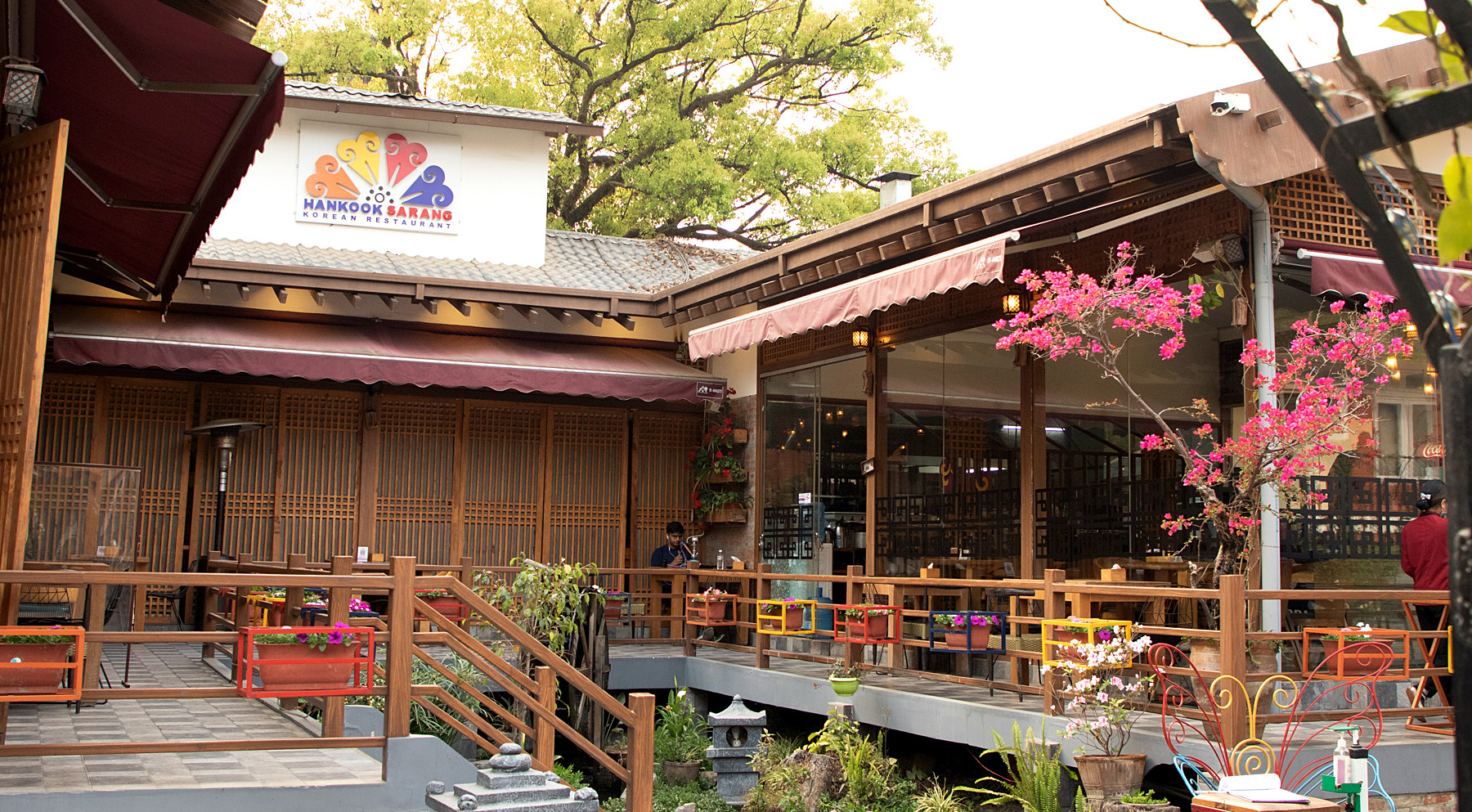
Food is relatively cheap. “A normal set-dish costing around Rs 1,000 is enough to feed two,” Gurung informs. “I don’t focus not just on food but also try to represent the Korean culture so that our clients can learn about the country,” he says. The restaurant offers no discount.
Gurung used to sell Soju, a Korean beverage, before the pandemic, but no more. Instead, customers get to taste a special Korean chhaang. You can sit on floor cushions or on chairs. For lovers of beautiful landscape, outdoor sitting is also available. You can pay in cash, or by credit or debit cards. On average, over 100 people visit the restaurant daily. Parking is available for 4-wheelers and 2-wheelers.
Opening time: 10 AM
Closing time: 10 PM
Contact: 01-4421711
Saan Sarang Korean Restaurant
Established around 11 years ago, Saan Sarang Korean Restaurant is located at Boudha, Kathmandu. Ang Yangdu Sherpa, the founder, started the restaurant to complement her family business, a trekking agency. Her clients wanted to taste Korean food, but there wasn’t a Korean eatery in the Boudha area at the time, prompting her to start one. Gradually, she also managed to titillate the taste-buds of locals.
Saan Sarang is a place for family dining, Sherpa says. She recommends customers taste pork BBQ first. “Pork barbeque is a major dish in Korea. Here, customers can make it themselves. A family can spend quality time doing the barbeque on their own,” she says.
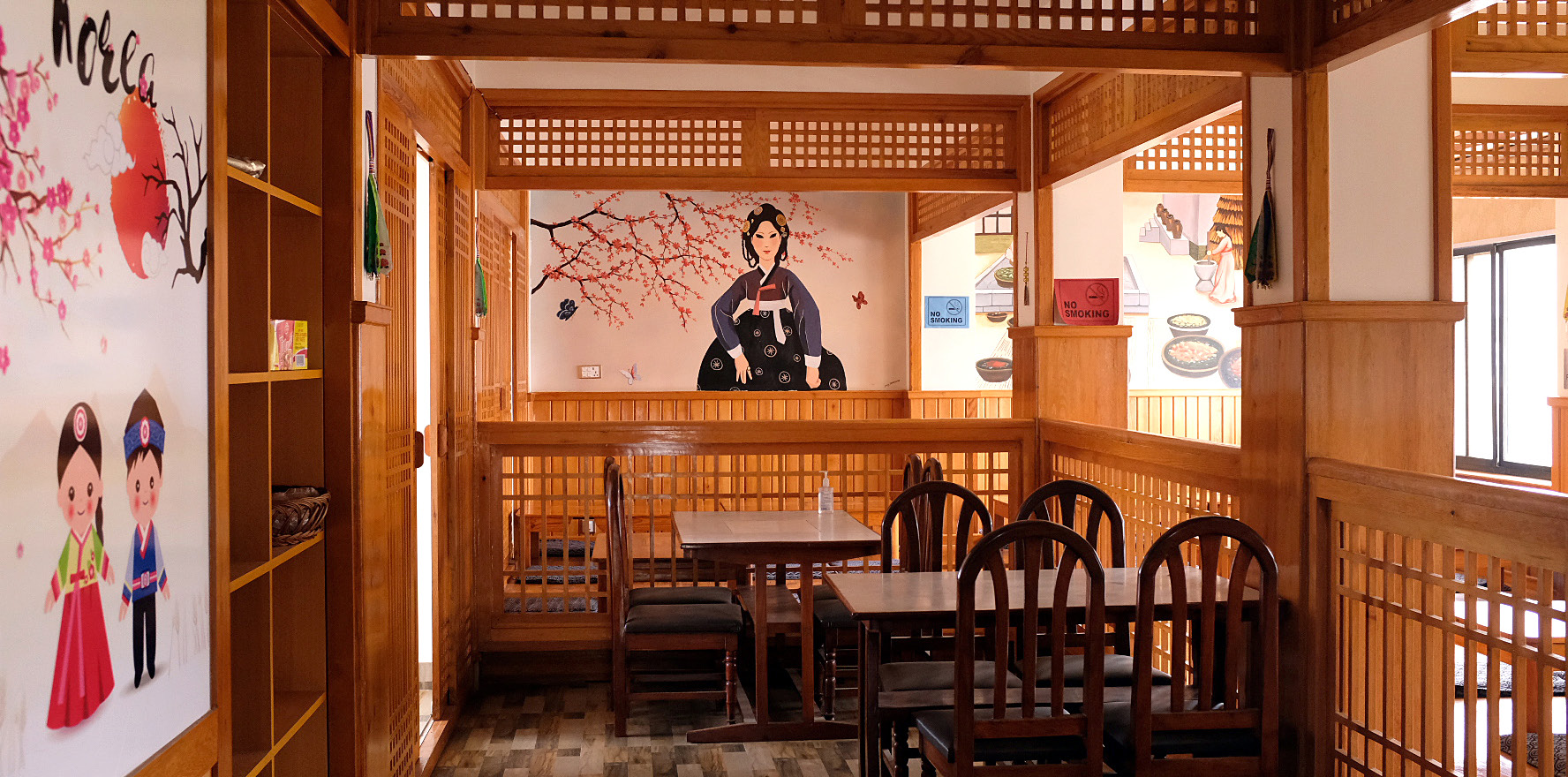
Prices range from Rs 300 to 1,500, with sushi, kimbap, and pancake on the cheaper side and seafood on the more expensive side. Most popular are pork BBQ, grilled fish, and kimbap. Parking is not a problem: outdoor or underground parking are available for 4-wheelers and 2-wheelers. The first floor has tables and chairs for sitting, while the second floor has traditional floor cushions. Available Korean beverages include Soju and Korean chhaang. There is also an outside garden for smoking.
Payment options are varied: cash, credit card, debit card, FonePay, and eSewa. About 100 people visit the restaurant daily.
Opening time: 9 AM
Closing time: 10 PM
Contact: 9851076235
Korean Kitchen Picnic
Established in Thamel in 2002 by a Korean photographer and his wife, and later handed over to the current Nepali owners, Korean Kitchen Picnic offers Korean food with genuine Korean taste, informs Sunil Magar, the manager and cashier. Food price ranges from Rs 375 to 1,850. Korean noodle ramen and kimbap are budget dishes, while pork BBQ is the most popular.
Magar recommends pork BBQ for newcomers to Korean food. “Korean restaurants are almost exclusively famous for pork items. That’s why people who love pork must try it Korean-style.”
Korean beverages are not available these days, but there are plenty of Nepali alternatives to choose from. There is shared parking for both 2 and 4-wheelers.
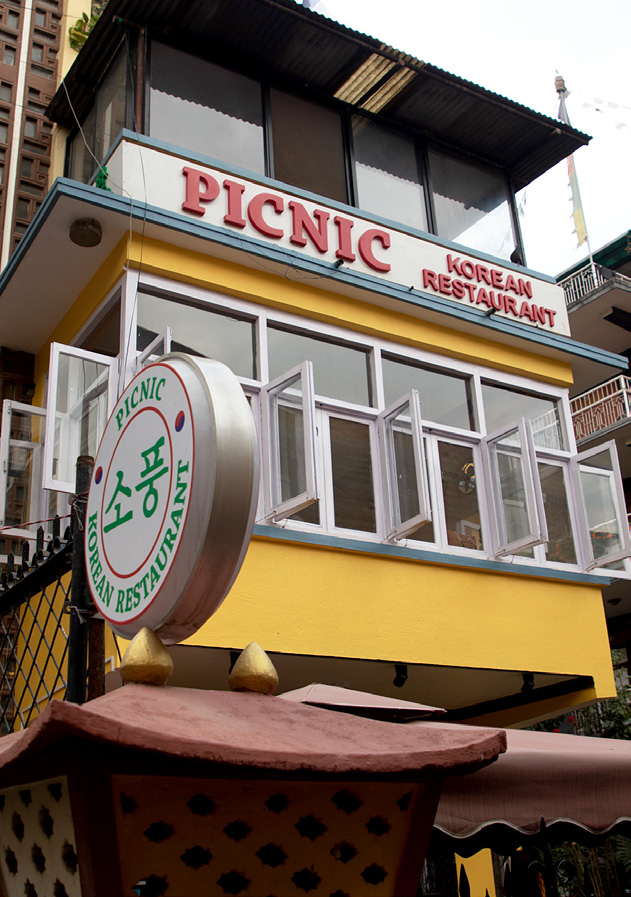
Of its four rooms, two are Korean-style sitting rooms while two have chair-and-table arrangement. The restaurant doesn’t offer any discount. Apart from cash, customers can pay by credit or debit cards apart from cash.
What makes Korean Kitchen Picnic different? “The taste of our food,” says Magar. “Our clients who have already visited Korea can attest that the food here has authentic Korean taste.” The owners also run an import and export business, and source all ingredients from South Korea.
Around 100-200 people visit the restaurant every day.
Opening time: 10:30 AM
Closing time: 8:30 PM
Contact: 01-4542420
Shuimter Korean Restaurant
Started in 2002 but later closed and reopened three and half years ago, Shuimter Korean Restaurant in Thamel offers you delicious Korean foods at an affordable price. The owner, Bijaya Yonzon, learned about Korean food while working in Korea. Pork BBQ and chicken BBQ are the two most popular items here. “A person visiting the Shuimter Korean Restaurant spends Rs 900 on average,” Yonzon says. “Although the restaurant is a little space-constrained, the food here is delicious. I cook them myself.”
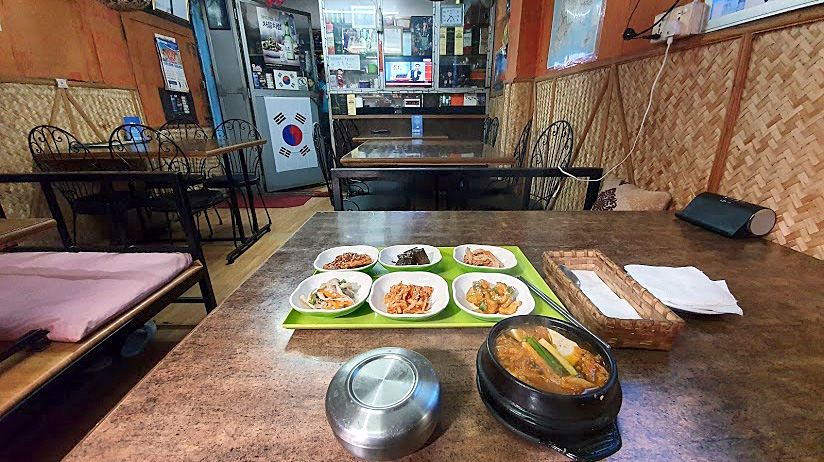
Earlier, Yonzon used to sell Soju and Korean chhaang. Soju is not available these days. Customers can either sit on the floor or make themselves comfortable on tables and chairs. The restaurant has no outdoor space and you can pay only in cash. “The most important aspect of the restaurant is tasty food,” Yonzon believes. On average, the restaurant sees 12 visitors a day. Yonzon recommends pork and chicken items.
The downside of being located in the congested Thamel is lack of parking. Prices are fixed.
Opening time: 8 AM
Closing time: 10 PM
Contact: 9843095723
Preetica T Mgr: Starting Young, Going Places
Preetica T Mgr can’t remember a time she wasn’t in love with music. At 14, she used to hum songs during classes, always crooned in the shower and was obsessed with music lessons. Her YouTube channel, Preetica T Magar, which she opened in 2015, was a spur-of-the-moment thing but then it would later help her establish her music career.

“I never had big plans for the channel and only dropped a few cover songs here and there,” the singer tells ApEx. “And I’ve only uploaded one original single in my YouTube channel.”
But these days her presence in the music industry isn’t limited to that channel. Since completing her diploma from Kathmandu Jazz Conservatory, she has never looked back. Today, she’s a singer, songwriter, composer and vocalist of the band Voodoo U. She also has singles titled ‘Halka Fulka’ and ‘Baiguni’ under her belt and is gearing up for another one that’s dropping on 3 April 2021.
No stranger to public performances, the singer has gone on to perform on multiple platforms ranging from night gigs at restaurants to touring with Women in Concerts in 2019. So far, outside Kathmandu valley, she’s played on stages in Butwal, Pokhara, Besisahar and Birtamod.
Even with all these accomplishments at a tender age of 22, her creative process remains the same. “I’m always humming new melodies. I write lines in pieces and once they start taking shape, I work on giving them structure,” she shares. “You can’t tell when inspiration is going to hit you. Sometimes I’m watching a movie or am in the middle of a concert and suddenly ideas start flowing.”
|
If you were given a chance to have a sit-down interview with any musician, dead or alive, who would you pick? Lauryn Hill. What genre of music would you say is your favorite? All genres of music are enjoyable but I feel most drawn to R&B. Where do you see yourself ten years from now? Definitely making music, performing more. Just learning more about music and life. Among all the songs you have made, which one is your personal favorite? Each song I’ve written and composed have different vibes to them. But ‘Baiguni’ was the first Nepali song I wrote. The whole process was wonderful even though it took me a really long time. In the end, I was happy with what I had made. You’ve performed on many stages. What was your favorite gig? Recently, my band performed at LOD with Women Rock. The entire time, I felt like everyone onstage was in tune with one another. There was barely any nervousness, and it was a show I’ll remember for a long time. As a woman, what have been your struggles in this industry? There have been a lot. But one that I can’t overlook is the fact that most of the gigs are always held at night. It’s unsafe to be out at that time and families are hesitant to let you stay out late. It’s problematic, especially when you’re working hard to make it as a musician. As a woman, our ideas are often easily disregarded or are only recognized if backed up by a notable person. I also feel like we don’t have a lot of female allies in this industry. What has been your favorite memory from your musical journey? I think it’s usually the small moments that make me the happiest. When the melody and the song come together. When you’re composing a tune that perfectly fits the vibe of the song. That split second of things aligning themselves with each other. Those are my favorite. If you could change one thing about the Nepali music industry, what would it be? I feel like the genres in Nepali music are limited. So I’d add variety to it, I’d allow more style. Who is your current favorite musician? Crush. Do you have any hobbies outside music? I’m a very outdoorsy person. Just walking and swimming make me happy. And I also really like standup paddleboarding. What song do you have on repeat right now? Leave the Door Open by Bruno Mars, Anderson. Paak and Silk Sonic. Who do you think was the most deserving winner at the recently-held 63rd Grammy Awards? Dua Lipa won the Best Pop Vocal Album for Future Nostalgia. I think that was well-deserved. |
Nawaraj Parajuli: In every beat a poem
“Whether an experiment is a success, is not the question. The question is whether an artist is ready to experiment. Keep experimenting, that’s the mantra for real artists,” says Nawaraj Parajuli, a popular contemporary Nepali poet. After successfully establishing the trend of Kavita concerts—reciting poems to music— Parajuli recently came up with a musical poetry “Eklai”, which has already garnered 260k views on YouTube. Eklai differs from his previous recitals as it has an additional element: beats. The poem, taken from his upcoming book “Ghar”, steals the show with its delicious combo of music, beats, and a phenomenal video in which he has acted.
This exceptional poet will soon host a television show “Forever with Nawaraj Parajuli” on Galaxy 4K TV, with poetry at its center, although the show, according to him, will also celebrate other art forms.
Having completed his Master’s Degree in English in 2014, he now has a fortnightly column in Nepali-language portal Shilapatra besides continuing to write poems and hold Kavita concerts.
Born in 1987 in Jalthal, eastern Jhapa to Hari Prasad Parajuli and Laxmi Devi Parajuli, he entered the Kathmandu Valley in order to pursue a master's degree. He says the valley brought out the poet in him and he started searching for new ways to demonstrate his creations.
His foray into poetry can be explained by his childhood love for arts of all kind. “I have always been a huge fan of arts,” he tells us. Reciting poems was an act that touched his soul even as a young boy. He remembers, “My father used to read poems from a book called Guna Ratnamala to me every night.” Parajuli for his part started by writing Gazals.
Manu Manjil’s poetry recital in Kathmandu’s Gurukul Theater in 2014 was a huge inspiration. “I told myself I would like to do something like that,” he recalls.
For a theater lover fascinated by acting, it was hard to confine his work within his notebook pages. It was then that he decided to fuse poetry with music, his other love.
At the same time, Parajuli chanced upon Samyak Maharjan, a flutist. When the two combined their skills, the audience would be left speechless. That was five years ago. In terms of popularity, his first real breakthrough came in 2017 during the launch of his book Sagarmatha Ko Gahirai. Parajuli had spent many sleepless nights preparing for the big recital, and it paid off. He now started getting invited abroad. Today, he has already performed in 20 countries. The book Sagarmatha Ko Gahirai, which had 36 poems, also bagged Khemkala-Harikala Lamichhane Foundation’s Padmashreee Award.
For Parajuli, his “short and sweet journey is filled with a myriad of memories” that he wishes to “live in forever”. An inspiration for many youths, Parajuli’s fans say his poems can heal wounds and energize people, while also giving them invaluable life lessons.
Famously, Nawaraj Dhakal, an audience member when he was performing in Lamjung five years ago, had submitted his three-hour exam paper in an hour just to watch him live. Later, Dhakal and his friends asked Parajuli to perform at their college. Parajuli doesn’t do these shows for free, as he aims to establish poetry as a profession. But he made an exception that one time.
Another time, while returning from India’s Varanasi, he had stopped at Butwal to eat chatpate by the roadside. Before leaving, the shop owner, who was a bit older than him, asked, “Are you the guy who performed the Aama poem?” Parajuli says the joy he then felt on being recognized for his poems was beyond words.
What attracts people to his poetry? He isn’t sure but he doesn’t want to know either. “When something is beautiful, you don’t always know the reason. And that’s okay,” he says. According to some people, Parajuli adds, his poems are more punchy when accompanied by music.
Musical poetry and Kavita concerts, for Parajuli, are attempts to add to art’s beauty. “Anything beautiful is important. That’s why musical poetry and Kavita concerts are important as well. I don’t want to prove anything. I just want this beauty to come through.”
For some people, his way of exploring poetry can be confusing. He is often asked if he is a rapper or a singer, and these questions leave him dumbfounded.
“This is creation. This is art,” he tells them.
Parajuli sees more and more youths getting into poetry—and it makes him immensely happy. He believes something magical is unfolding and he cannot wait to witness it.
Pariwartan: Cover artists to creators
Right since it started playing in the Thamel pub circuit back in 2008/2009, “Pariwartan” has been a busy band. Busy to the point that it was playing six nights a week, in and outside Thamel. In the pre-covid era, the band was one of the most sought-after set of musicians for live performances, traveling across Nepal to play at different venues. Pariwartan performs cover songs, in English and Nepali, ranging from modern pop to classic rock.
“The initial plan was not only to play covers but also to create our own music,” says Deepak Gurung, bass player and the only remaining founding member of the band that has in time gone through multiple line-up changes. After a string of trials and errors with different band members, the 37-year-old Gurung has finally found the perfect bandmates in singer/guitarist Gopi Shrestha, drummer Yugal Shahi and guitarist Pravesh Thapa Magar, all of whom are in their mid-20s. Joining the band between 2018 and 2019, the three reciprocate Gurung’s trust as they look to collectively forge a new identity.

When the pandemic shut down venues across the country and forced musicians to hibernate, the band took the time to finally create and record its own music. Pariwartan released its debut single “Ma Chu” in July 2020 and has since been writing more music in preparation for its debut album. “We have eight songs ready for the full-length album that we plan to release this June or July,” Gurung says.
With a background of playing cover music of artists of all genres, what genre does Pariwartan identify with? “We don’t know that yet,” says the singer Shrestha. “Our songs have turned out to be of multiple genres, so we can’t exactly tell people what genre we belong to.” Shrestha, with the help of guitarist Magar, writes the initial frame for Pariwartan’s music while other band members chip in with ideas to complete the songs. Sometimes, new material is made spontaneously in the band’s rehearsal space.
For a band that has made an image for itself doing covers, breaking out with originals is difficult. The audiences are so used to hearing regular covers that they don’t accept anything new from the band, especially its original music. This has been true of many past bands that were successful as cover artists but failed to win audiences with their originals. For Pariwartan, this has not been the case, its members say. “Surprisingly, our audiences request us to play originals at our shows,” Magar says. “Some even ask us to play all our originals.” Gurung says this is something his band is proud of.
After its debut album, Pariwartan might change its playlist to only originals. That, at least, is the plan. They want to be recognized for creating their own music. “The plan was always there,” Shrestha says. “We just found the right time to do so.”

The band has been keeping aside its earnings from shows to finance its music. Studio time, audio post production, music video production and promotion all require significant resources. With all of them (besides Gurung) dependent on music for their livelihood, the band has had to be astute with their funds.
As for now, the band is back to doing shows and preparing for the album. It recently released the official video for its single “Timi Ra Ma” and has a couple more music videos in the pipeline before the album release. Band manager Bijay Khadka then plans to organize a nationwide tour for Pariwartan to the album.
“I remember we were opening for the mighty Albatross at the end of 2018, when our guitarist Pravesh came to me and told me we would never reach their level if we stuck to playing covers,” Gurung ends with a recollection. “It was a big realization and we finally got into making our own music. Hope we succeed.”



















